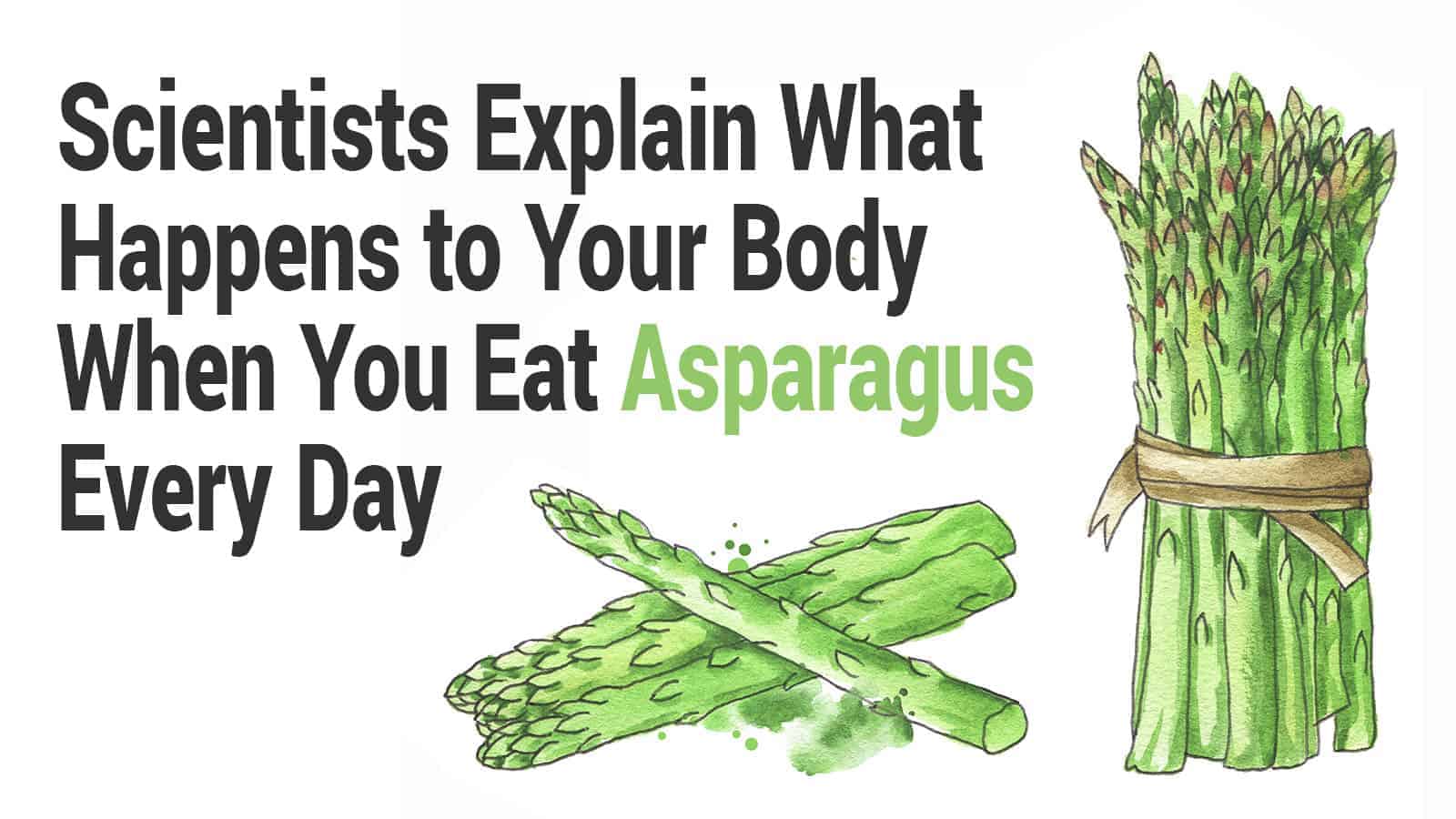Who doesn’t love to eat asparagus as a healthy food staple? Asparagus, or asparagus officinalis as scientists call it, is a perennial flowering plant species that grows throughout most of Europe and western Asia. Growing upwards of 39 to 59 inches (100 to 150 centimeters), asparagus are herbaceous plants; that is, they have no wooden stems (they’re fibrous), grow low to the ground, and are typified by ephemeral and seasonal growth.
Asparagus is also an incredibly healthy and versatile vegetable. Healthy because it contains just about every important vitamin and nutrient; versatile because asparagus can be cooked, prepared, and eaten multiple ways.
In this article, we’re going to focus on what happens to the body when you eat asparagus and the benefits of doing so. We’ll also go over the vitamin and nutrient makeup of asparagus and how each vitamin and nutrient functions in the body. Finally, we’ll cap things off by giving you a few tips on how to best prepare asparagus – even if you’re not the cooking type!
So, what happens to your body when you eat asparagus? Let’s find out!
Asparagus: A Superfood
“In ancient times, asparagus was renowned as an aphrodisiac, and maybe for good reason. (Asparagus)… contains a stimulating blend of nutrients that help boost energy, cleanse the urinary tract and neutralize excess ammonia, which can cause fatigue and sexual disinterest.” – Jessie Szalay, Live Science (source)
What is a “superfood,” you ask? Per the Oxford English Dictionary, a superfood is one that is “nutrient rich … considered to be especially beneficial for health and well-being.”
Mentioned in the widely-read magazine, Woman’s Day, as one of the top 50 healthiest foods, asparagus is certainly worthy of the title “superfood.” The magazine cites asparagus’ high concentration of folate (1/3 of daily RDI) and vitamin K (50% RDI) as the reason for its inclusion. We’ll talk more about folate and “K” later on.
Asparagus is also a potent anti-inflammatory and contributes to brain development and function. Moreover, asparagus helps transport glucose throughout the body – an essential component of energy. It also detoxifies the body and may help to prevent certain cancers – including bone, breast, colon, and lung cancers.
It’s also crucial that any superfood be low in calories. To this end, asparagus contains only 20 calories per serving (five spears). Asparagus is also fat-free and is low in sodium.
Asparagus Nutrition Information
This superfood provides a good number of vitamins and minerals. It’s high in B-vitamins, folate, vitamin K, and vitamin C. It also contains fair amounts of vitamin A, potassium, and dietary fiber.
Here’s the nutrition information for asparagus:
Serving size: 5 asparagus spears (~ 3 oz.)
Calories: 20 (0 calories from fat)
Amount per Serving %Daily Value (DV)
Total Fat 0 g 0%
Cholesterol 0 g 0%
Sodium 0 g 0%
Potassium 230 g 7%
Vitamin A 10%
Vitamin C 15%
Total Carbohydrate: 4 g 1%
Dietary fiber 2 g 8%
Sugars: 2 g —
Protein 2 g —
Calcium 2%
Iron 2%
Unfortunately, the typical U.S. Food and Drug Administration nutrition information (and some labels we see in supermarkets) doesn’t include some critical nutrients and vitamins. For example, many labels omit both folate and vitamin K, which are both critical to the human body and found in high amounts in asparagus.
On that note, here is the nutritional information for folate and vitamin K per one serving of asparagus, as well as the function of both:
Folate (50% RDI): Folate – a salt of folic acid – supports tissue growth and cell function. Along with vitamins C and B12, folate assists with the breakdown, creation, and use of protein in the body. Folate also helps to form DNA and red blood cells.
Vitamin K (33% RDI): The body requires adequate levels of vitamin K to initiate blood clotting. “K” is a component of prothrombin, the precursor to thrombin, which causes the clotting of blood by building fibrous networks at the site of the wound.
As a good source of Vitamins A, C, and E, and polyphenols, here are the functions of each:
Vitamin C (15% RDI): Growth and repair of tissues; heals wounds and forms scar tissue; an important co-factor in a protein that makes blood vessels, ligaments, skin, and tendons.
Vitamin A (10% RDI): Forms and maintains healthy teeth; involved in the structuring of the mucous membranes, skeleton, and soft tissue. High concentrations within the eye’s retina (i.e. retinol), providing pigmentation; promotes good vision.
What Asparagus Does for Your Body
Having factual information is nice, you say, but what about the actual benefits of eating asparagus? What does eating asparagus do for me? Read on, friend!
Asparagus helps your heart health
The high level of B-vitamins found in asparagus is great for your ticker. Why? Because B vitamins regulate homocysteine, an amino acid linked to an increased risk for heart disease.
Asparagus also contains a fair amount of soluble fiber, which is linked to a lower risk of heart disease. Finally, the plant contains a high concentration of antioxidants and has anti-inflammatory properties, both of which reduce the risk of heart problems.
Asparagus lowers your risk of type 2 diabetes
Per a study published in the British Journal of Nutrition, asparagus both improves insulin secretion and “beta-cell” function. Beta-cells are found in the pancreas and are crucial for the production, storage, and distribution of insulin.
The potent anti-inflammatory and anti-oxidation effects of asparagus further decrease the risk of type 2 diabetes.
Asparagus helps you to age slower
Asparagus is a wonderful vegetable for counteracting the aging process. Cognitively, its elevated levels of vitamin B12 combat the mechanisms of cognitive decline. Research also shows that healthy levels of both folate and B12 appear to increase the response time and mental flexibility of older adults.
It’s not just the brain where asparagus has turn-back-the-clock powers: its richness in the antioxidant glutathione helps to prevent oxidative stress in other cells of the body as well.
Asparagus improves your skin health
Relatedly, asparagus’ high concentration of glutathione protects the skin from pollution and sun damage. In a 2014 study published in the journal Clinical, Cosmetic, and Investigational Dermatology, female participants glutathione lotion to half of their face and a placebo lotion to the other half. The side with glutathione lotion showed “… significant increases in moisture … suppression of wrinkle formation … and improvement to skin smoothness.” Moreover, there were zero adverse effects of usage.
Asparagus is a powerful diuretic
As a natural diuretic, asparagus helps to rid the body of toxins and excess sodium. These benefits are particularly pronounced in the kidneys, where research finds that asparagus may help to prevent kidney stones. (Those who test for high uric acid and have problems with kidney stones, however, should avoid asparagus, according to the National Institutes of Health.)
Asparagus promotes digestive health
Asparagus is high in both fiber and protein – two important nutrients for good digestive health. Another reason why asparagus appears to be good for digestive health is that it contains inulin, which is not only dietary fiber but a prebiotic (it doesn’t get digested before moving to the large intestine, unlike probiotics which are digested beforehand). Inulin also helps to improve nutrient absorption and may help lower the risk of colon cancer.
Asparagus supports fetal health
Folate is a crucial nutrient for women who are pregnant because it supports proper brain development. As mentioned, one serving of asparagus contains about one-third of the RDI for folate. Per the Mayo Clinic, the RDI for folate is 400 micrograms (mcg), and the RDI for women who are either planning to be pregnant or are pregnant is between 400 to 800 mcg.
Final Thoughts: Preparing Asparagus
How much nutrition asparagus provides depends on how it is cooked. The best way to cook asparagus is probably quick steam and boil. Food science research shows that asparagus best retains its nutrients under three conditions:
(1) minimal exposure to heat
(2) minimal cooking time
(3) minimal surface contact with hot liquids (e.g. boiling water)
Besides steaming or a fast boil, asparagus may also be served raw or cold. Nutrition-wise, this is the best way to eat asparagus.
Here are some ideas for quick serving asparagus:
- Add raw asparagus to a salad
- Chop some asparagus and add to an omelet
- Sautee asparagus foods such as chicken, garlic, shiitake mushrooms, or tofu.
- Toss a pasta mix with asparagus, olive oil, and spices (if desired)
Enjoy!

















